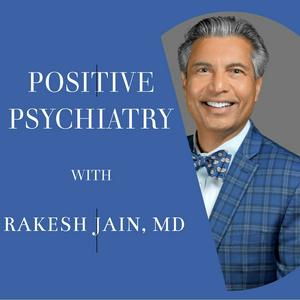Beyond Symptoms: The Promise of Positive Psychiatry
Psychiatry finds itself at a crossroads. For decades, we've focused on symptom reduction—targeting depression, anxiety, and other mental health challenges with medications and traditional therapies. But something crucial has been missing from this equation.In this inaugural episode of Positive Psychiatry with Rakesh Jain, I reveal what patients truly want from mental health treatment—and it might surprise you. Drawing from groundbreaking research by Zimmerman and colleagues at Brown University, I share how patients rank their priorities differently than clinicians expect. While symptom reduction matters, patients place even greater importance on regaining life satisfaction, finding meaning, and recapturing joy.As a psychiatrist with over three decades of experience, I've witnessed firsthand both the triumphs and limitations of traditional approaches. That's why I introduce the concept of positive psychiatry—not as a replacement for conventional methods, but as their essential complement. I explain how psychiatric disorders don't just cause negative symptoms; they actively erase positive psychological traits like optimism, resilience, enthusiasm, and happiness (the "HERO" traits).The science behind positive psychiatry is compelling. Brain imaging studies show optimistic people have larger gray matter volumes in key regions and different activation patterns in emotional regulation centers. Even more fascinating? Positive emotions can actually lower inflammation markers in the body. This isn't just feel-good psychology—it's neurobiologically sound medicine.I also introduce evidence-based interventions that work, including Well-Being Therapy and the Wild 5 Wellness Program, which has demonstrated remarkable results in just 30 days: 51% increases in enthusiasm, 63% improvements in resilience, and 43% reductions in depressive symptoms.Join me on this journey to expand our definition of successful treatment beyond symptom elimination toward cultivating true wellness. Subscribe to future episodes as we explore practical strategies to help patients—and ourselves—build lives filled with meaning, joy, and resilience.Zimmerman M, et al. Am J Psychiatry. 2006;163(1):148-150Demyttenaere K, et al. J Affect Disord. 2015;174:390-396.Jeste DV, et al. J Clin Psychiatry. 2015;76(6):675-683.Becker KD, et al. Adm Policy Ment Health. 2011;38(6):440-458.Gallup and Sharecare Announce 2017 State Well-Being Rankings. www.well-beingindex.com/2017-gswbi-state-rankings. Accessed August 21, 2018.Jain S, et al. Presented at: 29th Annual US Psychiatric and Mental Health Congress; October 2016; San Antonio, TX. Spinhoven P, et al. PLoS One. 2015;10(10):e0139912. Menezes AM, et al. PLoS One. 2013;8(11):e80370.Burgdorf J, et al. Neurosci Biobehav Rev. 2006;30(2):173-187. Loonen AJ, et al. Med Hypotheses. 2016;87:14-21. Berridge KC, et al. Neuron. 2015;86(3):646-664. Kringelbach ML, et al. Trends Cogn Sci. 2009;13(11):479-487. Berridge KC, et al. Curr Opin Neurobiol. 2013;23(3):294-303.Greenberg T, et al. Soc Cogn Affect Neurosci. 2015;10(4):605-611.Yang J, et al. Neurosci Lett. 2013;553:201-205.Matsunaga M, et al. Neuro Endocrinol Lett. 2011;32(4):458-463www.JainUplift.com


